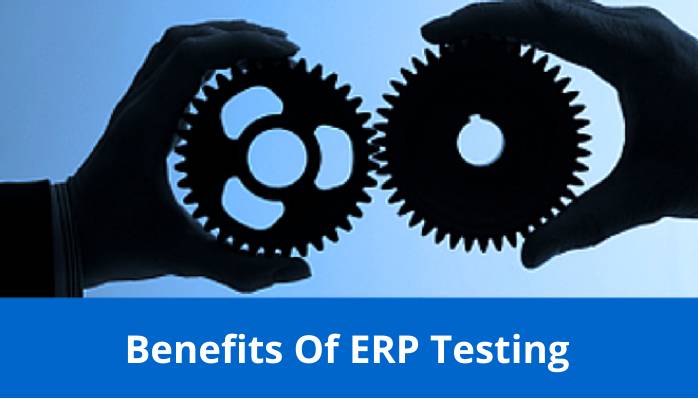ERP solutions are used in all organizations these days, be it small enterprises, SMEs, or large organizations. Entrepreneurs and employees both acknowledge the benefits of deploying ERP Testing Techniques in their business to improve their efficiency and productivity. ERP means Enterprise Resource Planning, which implies the integration of various resources, like man, machine, method, and materials, to meet the business requirements by streamlining different processes to achieve overall efficiency and improve process management. Based on the particular business requirements of a company, customized ERP testing services are designed to eliminate manual tasks and automate diverse business processes.
ERP Testing
During implementation, ERP Testing is done to verify the functioning of software solutions. It is used for Quality Assurance and guarantees that the ERP implementation is operating correctly before being launched to prevent crashing of the program at the time of going live. The number of bugs is also significantly reduced due to the implementation of successful ERP testing tools. Failure risks are reduced as bugs are addressed initially, by thorough ERP testing techniques. Proper testing is used to check the functioning by analyzing the forms or reports and help in saving the system downtime.
Initially, ERP systems were designed for manufacturing and supply chain processes, but over the years, it has catered to diverse industry verticals, including, Retail & Distribution, Finance, Insurance & Realty, Information Technology, Professional Services, Healthcare, Non-Profit, Construction, Education, Telecommunications, etc. According to research by Fior Markets, “Global ERP Software Market is expected to reach USD 61.69 Billion by 2025.” The report also predicts during forecast period, the manufacturing segment will hold the largest share of 24.37%, mainly due to cloud hosting for ERP.
Business gains due to ERP Testing
ERP testing is essential for enterprises to ensure that there are no functionality issues at different points of the system. There are different types of ERP testing, and they are:-
- Functionality testing
- Performance testing
- Integration testing
Functionality testing ensures that all the features are working according to the functional requirements, precise list of definitions, and goals. On the other hand, Performance testing examines the performance of an ERP solution with different systems, when integrated. This testing helps in ensuring the ERP with various loads to test the system’s robustness in the working environment. Lastly, Integration testing checks for the integrity of the ERP system along with processes it needs to run. It helps in dealing with real-world scenarios.
Test automation ensures that all the processes involved in the implementation of ERP in your organization happen in the correct manner. Verification of a centralized data source is cardinal for any ERP application. Test automation helps you test data process and security.
ERP Testing services help the users or stakeholders to get trained and adapt themselves to the new software and its features. The end users also get the real-time feel of the system and can use it readily to streamline and automate work processes. A strategic approach for using ERP testing tools enables businesses to gain benefits and grow sustainably.
Main advantages of deploying an ERP system to your business.
1. Data Integration
Having unified data is the USP of using an ERP as it serves a single data hub and eliminates disconnected systems, across all the departments. It offers a clear line of sight, as employees need not maintain bulk documentation or standalone applications for operation management.
2. Streamlined operations
Employees can navigate smoothly through complex processes using ERP systems and secure a uniform and systematic flow of business information. Automation of repeated tasks reduces time and error frequency and allows employees to focus on valuable tasks for business growth. ERP testing scenarios help to prepare the staff by user onboarding and adoption framework.
3. Data Security
ERP testing ensures that your data is entirely secured by substituting a single input system in place of inter-departmental data inputs or reports. Both on-premise and cloud ERP systems offer excellent security features, along with back-ups of critical and sensitive information. Advanced user-permission settings, allows managers to protect sensitive data from employees and other threats.
4. Better Analysis
ERP software allows more in-depth analysis into the system as they get a better insight into various operations, to identify and remove bottlenecks for efficient processes. Superior planning and reporting are possible only if business leaders can recognize operational strengths through ERP. Effortless and timely fetching of relevant reports is critical for proper business analysis and meeting different regulatory compliances.
5. Better Customer Satisfaction
With ERP implementation, it is guaranteed that all your business processes will speed up and deliver accurate results, which in turn will result in higher customer satisfaction. It has been reported that customer satisfaction increased to 68% on average due to ERP deployment. Centralized customer data and processes are streamlined and secured, leading to customer retention through quality services.
6. Improved Team Collaboration
ERP systems provide a transparent platform for teams to collaborate efficiently. It acts as a centralized hub of information of all the team members so that they can share their workload seamlessly, without shifting responsibility or duplicating the workload of administration. In turn, strong work culture is promoted by using ERP systems and keeps the employees motivated.
7. Empowering businesses
Implementation and ERP testing techniques allow the overall business processes by data collection, process optimization, and automation of routine tasks. It enables business leaders to work in a quick, smart, and agile way, with pocket-friendly business solutions. Decision making and business analysis are made accessible for pioneers to help effectively steer the organization.
It is indispensable for any organization to invest in ERP Testing services as the business benefits of an ERP system assure them to place their business on the modern map. It is an asset to any organization, to amplify business profits and facilitate motivating work-culture for their employees.




